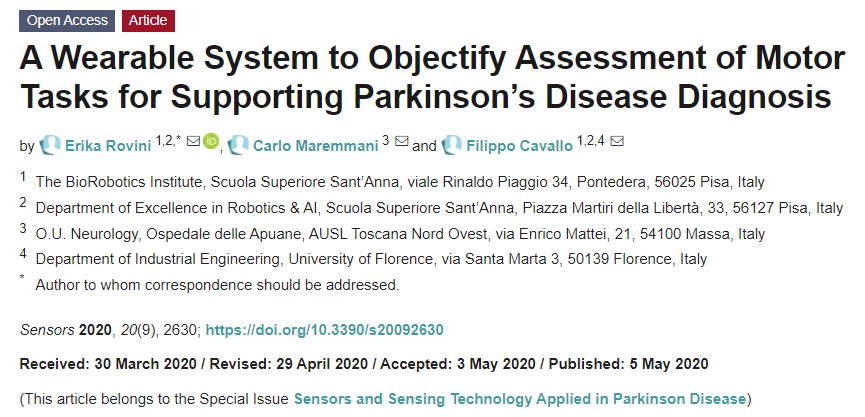
05 May New Pharaon publication: A Wearable System to Objectify Assessment of Motor Tasks for Supporting Parkinson’s Disease Diagnosis
Objective assessment of the motor evaluation test for Parkinson’s disease (PD) diagnosis is an open issue both for clinical and technical experts since it could improve current clinical practice with benefits both for patients and healthcare systems. In this work, a wearable system composed of four inertial devices (two SensHand and two SensFoot), and related processing algorithms for extracting parameters from limbs motion was tested on 40 healthy subjects and 40 PD patients. Seventy-eight and 96 kinematic parameters were measured from lower and upper limbs, respectively. Statistical and correlation analysis allowed to define four datasets that were used to train and test five supervised learning classifiers. Excellent discrimination between the two groups was obtained with all the classifiers (average accuracy ranging from 0.936 to 0.960) and all the datasets (average accuracy ranging from 0.953 to 0.966), over three conditions that included parameters derived from lower, upper or all limbs. The best performances (accuracy = 1.00) were obtained when classifying all the limbs with linear support vector machine (SVM) or gaussian SVM. Even if further studies should be done, the current results are strongly promising to improve this system as a support tool for clinicians in objectifying PD diagnosis and monitoring.
Access the full article (click here)
Rovini E, Maremmani C, Cavallo F. A Wearable System to Objectify Assessment of Motor Tasks for Supporting Parkinson’s Disease Diagnosis. Sensors. 2020; 20(9):2630. https://doi.org/10.3390/s20092630

